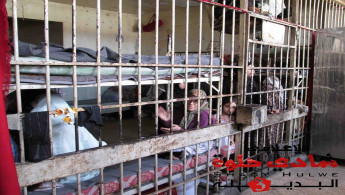Syria's children behind bars
Sharbaji's children share their fate with the thousands of other Syrian children documented in a recent report published by the Syrian Network for Human Rights (SNHR). According to the network, at least 9,500 children have been imprisoned since the start of the uprising almost four years ago. Many were imprisoned because of their relatives' alleged crimes.
The report notes that more than 99 percent of arrests were carried out without legal authority. Regime-aligned troops would simply kidnap a child because they had participated in a demonstration or for taking part in other activities deemed "anti-regime", such as relief operations, said the report. Some of the detained children were reportedly tortured to prompt confessions from their parents, forced to watch their children suffering horrific abuses.
Torture and death
| Some of the children detained were tortured in front of their parents to force confessions out of them. |
Marwan Abdulsalam, a former detainee at the Military Intelligence Branch, told al-Araby al-Jadeed that "there were more than 30 children there; some of them were younger than ten".
"There were times when the children were beaten with a flexible silicon rod," he said. "They were in pain and screamed, but the interrogators didn't stop beating them to get more information out of them, about their families and relatives."
According to SNHR, children are subject to almost the same torture methods employed on adults, including sexual violence.
The network has documented the deaths of at least 95 children at regime detention centres due to torture. Among them was 15-year-old Uqba Ahmad al-Jumaa, arrested in Taybat al-Imam city near Hama, and Mohammed Fares al-Durrah, arrested in the hospital in Qutayfah, near Damascus, where he was being treated.
A small number of children have been referred to military courts which, according to lawyer Yassin Jalal, is illegal.
"The law stipulates children under 18 who have committed criminal offences must be referred to a criminal court, where juvenile laws can be applied to them, and this also means more lenient sentences," Jalal told al-Araby.
Jalal also said thousands of children had been arrested since the start of the uprising, and regime officials had deliberately not referred many to any judicial body.
"They sent some of them to military field courts, so they could issue harsh and unjust sentences against them, disrespecting the simplest, most basic principles of human rights."
This is an edited translation from our Arabic edition.



